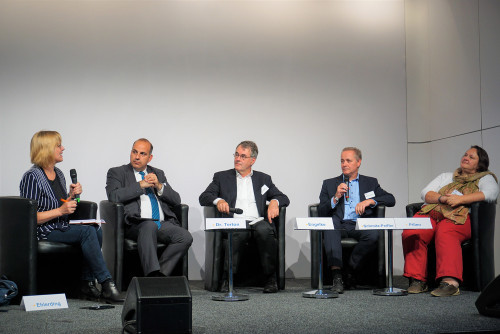The annual conference of the Renewable Energy Research Association provided an overview of the current state of research on the heating transition. New strategies and technologies were presented at the Berlin Environmental Forum on October 12 and 13 that can be used to implement the heat transition technically, economically and politically.
Professor Frank Baur, one of the two conference chairs, describes the current need for action: "The time window for climate protection is becoming ever narrower, and the tighter political conditions are also increasing the urgency for a sustainable and socially acceptable heat supply." His colleague, Professor Michael Nelles, is encouraging: "The knowledge for the steps that need to be taken now is available and can be integrated into a holistic concept so that the heat supply can be realized in a climate-neutral and efficient manner."
Conference presents solutions for the heating transition
The disruption of Russian gas supplies has made it clear with renewed force that Europe must reduce its dependence on fossil fuel imports and increase the security of supply for affordable, predominantly regionally sourced heat. The climate protection report adopted at the end of September once again makes it clear that the pace of sustainable system change must be significantly increased.
"At its annual conference, the ForschungsVerbund Erneuerbare Energien will be showcasing the research solutions that can be used to implement the heating transition in a timely manner so that climate protection and security of supply are guaranteed," says conference director Michael Nelles, describing the objective.
Frank Baur specifies: "The heating transition needs new technological solutions for the sustainable supply of heat to buildings, municipalities, districts and industrial processes. In addition, integrated concepts are needed in which the diverse solutions for heating and cooling are efficiently linked on the basis of a resilient planning foundation and also interlock with the electricity and mobility sectors in a system-optimized manner."
Heat transition for the building sector
The energy renovation rate for existing buildings is still far too low. The conference examines where exactly the obstacles lie and which approaches can increase the renovation rate in terms of technology, cost-effectiveness and acceptance. In Germany, building owners will soon have to convert around 20 million individual building heating systems from fossil fuels to renewables. The shortage of skilled workers makes it all the more urgent to find solutions for the complex installation of sustainable heating solutions and establish them on the market. Michael Nelles explains: "In the current conversion phase, the installation of a pellet boiler or a sustainable hybrid system consisting of a heat pump and biomass boiler still requires significantly more time and training. That's why research has developed digital aids to help professionals offer and implement a sustainable alternative to oil, gas and coal for every building in a timely manner."
Heat pumps make environmental heat usable for buildings. For an effective heat transition, this technology must also be widely implemented in existing buildings. The presentation teams will therefore analyze the systemic challenges for heat pumps, especially in larger existing buildings in densely populated urban areas, and show how these can be solved.
In the building stock of the future, intelligently operated buildings will play an important role in optimizing the overall energy system. Possible approaches include sector coupling, vehicle-to-grid, grid-friendly power-to-heat and intelligent control.
As a heat source, deep geothermal energy can cover around 25 % of Germany's heating requirements with domestic climate-neutral energy using current technology. This huge potential has hardly been tapped to date. The development of new technologies should make it possible in future to use deep geothermal energy even in geologically unfavorable regions with high heat demand.
Supplying industry with sustainable heat
Industrial process heat accounts for a fifth of global energy use. In the presentations, the scientists will show how sustainable process heat can be provided, for example, with concentrated solar power, high-temperature heat pumps or a combination of both systems.
They will also identify savings options that can reduce the demand for process heat on the demand side and investigate various high-temperature heat storage systems that can be used to supply the various industrial applications around the clock in line with demand. To supply heat-intensive industrial processes with sustainable energy sources, new types of tailor-made thermal, electrical and photocatalysts are also being presented, which are based on readily available materials and have been optimized in terms of their energy and material efficiency. The important role of bioenergy in the provision of process heat will also be highlighted.
The heating sector must be considered systemically
In recent years, the necessary measures for the heating transition have not been tackled by politicians to the extent and at the speed required. In addition, the transformation in the heating sector is more difficult than in the electricity sector because the technologies, market structures, players and cost structures are significantly more heterogeneous and complex. There are a large number of good research approaches which, taken together, can contribute to the successful implementation of the heating transition. It is important to combine the research approaches on heat supply, heat distribution and heat networks into an integrated systemic solution on the basis of reliable heat planning and to view them from a holistic perspective that takes into account all dimensions of sustainable development and the user's point of view.



